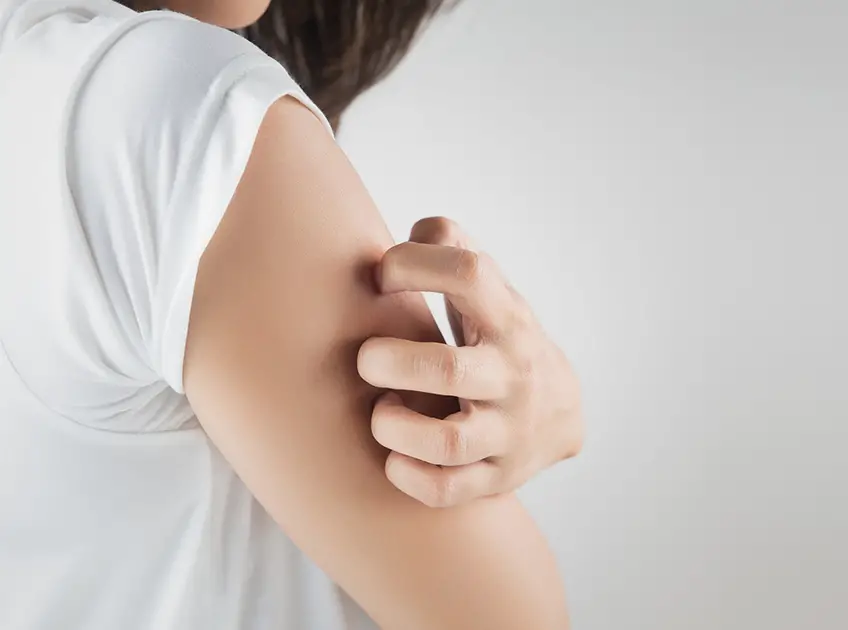
Important: This article is for informational purposes only. Please read our full disclaimer for more details.
As the weather gets warmer, we start to spend more time outdoors. And with that comes the inevitable mosquito bites. While they may be annoying, mosquito bites are usually harmless. But in some cases, they can transmit diseases like malaria and Zika virus.
There are a number of different ways to prevent mosquito bites, including using insect repellent and wearing long-sleeved clothing. But sometimes, bites are unavoidable.
If you do find yourself with a pesky mosquito bite, there are a few things you can do to find relief. One home remedy is to use essential oils. Essential oils are concentrated liquids that contain the aromatic compounds of plants. They’re often used for their healing properties and pleasant scent.
The 10 Best Essential Oils for Mosquito Bites
1. Lavender Oil

Lavender oil has anti-inflammatory and analgesic properties that can help to soothe the skin and reduce pain.
2. Peppermint Oil

Peppermint oil contains menthol, which has a cooling effect on the skin. It can also help to reduce itching and swelling.
3. Tea tree Oil
Tea tree oil is an antiseptic that can help to prevent infection. It’s also effective in reducing inflammation and itchiness.
4. Eucalyptus Oil
Eucalyptus oil has both anti-inflammatory and mosquito-repellent properties. It’s also effective in relieving pain.
5. Chamomile Oil
Chamomile oil has calming and soothing properties. It can help to reduce itchiness and inflammation.
6. Rosemary Oil
Rosemary oil contains compounds that can help to repel mosquitoes. It’s also effective in reducing pain and swelling.
7. Basil Oil
Basil oil has both mosquito-repellent and anti-inflammatory properties. It can also help to soothe the skin.
8. Cinnamon Oil
Cinnamon oil is an effective mosquito repellent. It’s also effective in reducing pain and swelling.
9. Mint Oil
Mint oil has a cooling effect on the skin. It can also help to reduce itchiness and swelling.
10. Lemongrass Oil
Lemongrass oil is an effective mosquito repellent. It’s also effective in reducing inflammation and pain.
How to Use Essential Oils for Mosquito Bites?
There are a few different ways you can use essential oils for mosquito bites. You can apply the oils directly to the skin or you can add them to a diffuser.
- If you’re applying the oils directly to the skin, it’s important to dilute them with a carrier oil like jojoba oil or coconut oil. This will help to prevent irritation.
- To use a diffuser, add a few drops of the oil to the water. Then, turn on the diffuser and let it run for 30 minutes.
- You can also add a few drops of the oil to a spray bottle filled with water. Then, spritz the mixture onto your skin whenever you’re outdoors.
Caution:
When using essential oils, it’s important to test them on a small area of skin first to make sure you’re not allergic. If you experience any redness, swelling, or irritation, discontinue use immediately. Pregnant women and children should consult a doctor before using essential oils.
Essential oils are a natural and effective way to treat mosquito bites. They can help to reduce pain, itchiness, and swelling. And they can also help to prevent infection, just make sure to use them safely. Which essential oil do you think is the best for mosquito bites? Let us know in the comments below!
You Might Also Like:
- 8 Best Essential Oils For Poison Ivy
- The 7 Best Home Remedies for Poison Ivy
- How to use Baking Soda for Poison Oak?
- 7 Best Lotion For Insect Bites
- 7 Essential Oils for Ants
- 8 Essential Oils for Fleas And How To Use
- 11 Simple Home Remedies for Mosquito Bites
- The 7 Best Essential Oils for Allergies
- 7 Best Lotion For Insect Bites
- The 7 Best Essential Oils For Corns
- How to Get Rid of Houseflies at Home Naturally
- The 8 Effective Home Remedies for Itchy Skin
- The 10 Best Home Remedies to Get Rid of Bed Bugs















